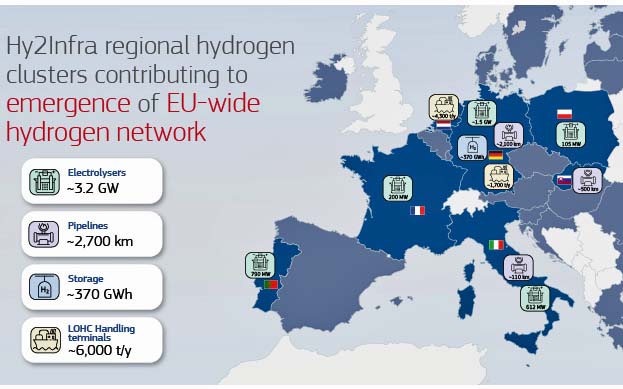The European Commission (EC) has approved state aid of up to €6.9bn from seven member states for the third major project of common European interest in the hydrogen value chain.
This includes the Hamburg Green Hydrogen Hub (HGHH), which Hamburger Energiewerke is implementing together with Luxcara at the Moorburg site in the Port of Hamburg to build an electrolyser – as well as the Hamburg Hydrogen Industrial Network (HH-WIN), planned by Gasnetz Hamburg, to build the first 40km of a hydrogen network.
The EC has approved, under EU State aid rules, a third Important Project of Common European Interest (IPCEI) to support hydrogen infrastructure. This IPCEI is expected to boost the supply of renewable hydrogen, thereby reducing dependency on natural gas and helping to achieve the objectives of the European Green Deal and the REPowerEU Plan. The project, called “IPCEI Hy2Infra”, was jointly prepared and notified by seven Member States: France, Germany, Italy, the Netherlands, Poland, Portugal, and Slovakia. The Member States will provide up to €6.9bn in public funding, which is expected to unlock €5.4bn in private investments. As part of this IPCEI, 32 companies with activities in one or more Member States, including small and medium-sized enterprises (SMEs), will participate in 33 projects.
IPCEI Hy2Infra will cover a wide part of the hydrogen value chain by supporting:
- the deployment of 3.2 GW of large-scale electrolysers to produce renewable hydrogen;
- the deployment of new and repurposed hydrogen transmission and distribution pipelines of approximately 2,700km;
- the development of large-scale hydrogen storage facilities with capacity of at least 370 GWh; and
- the construction of handling terminals and related port infrastructure for liquid organic hydrogen carriers (‘LOHC’) to handle 6,000t of hydrogen a year.
Participants will collaborate on interoperability and common standards to prevent barriers and facilitate future market integration. The IPCEI will support the gradual emergence of an EU-wide hydrogen infrastructure starting from different regional clusters.
Several projects are expected to be implemented in the near future, with various large-scale electrolysers expected to be operational between 2026 and 2028, and pipelines between 2027 and 2029.
Image: Step-by-step development of an EU-wide hydrogen infrastructure (credit: European Union; source: Hamburg Port)



